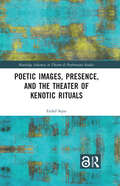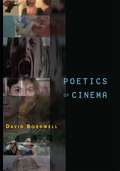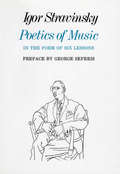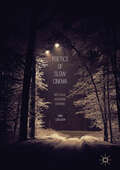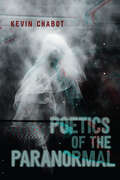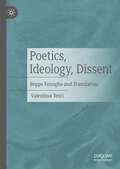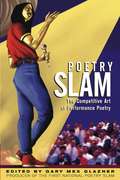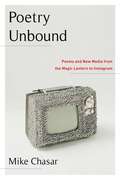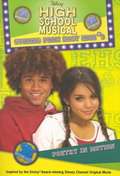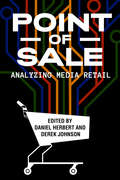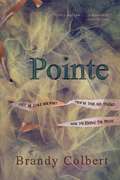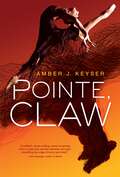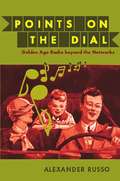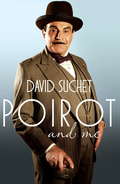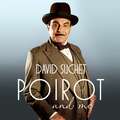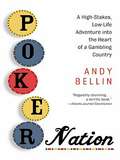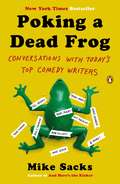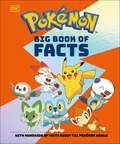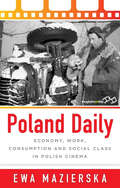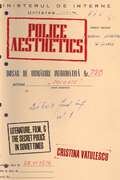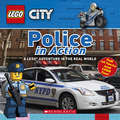- Table View
- List View
Poetic Images, Presence, and the Theater of Kenotic Rituals (Routledge Advances in Theatre & Performance Studies)
by Eniko SepsiThis book explores the interrelation of contemporary French theatre and poetry. Using the pictorial turn in the various branches of art and science, its observable features, and the theoretical framework of the conceptual metaphor, this study seeks to gather together the divergent manners in which French poetry and theatre address this turn. Poetry in space and theatricality of poetry are studied alongside theatre, especially to the performative aspect of the originally theological concept of "kenosis". In doing so the author attempts to make use of the theological concept of kenosis, of central importance in Novarina’s oeuvre, for theatrical and dramatological purposes. Within poetic rituals, kenotic rituals are also examined in the book in a few theatrical practices – János Pilinszky and Robert Wilson, Jerzy Grotowski and Eugenio Barba – facilitating a better understanding of Novarina’s works. Accompanied by new English translations in the appendices, this is the first English language monograph related to the French essayist, dramaturg and director Valère Novarina’s theatre, and will be of great interest to students and scholars in theatre and literature studies.
Poetics of Cinema
by David BordwellBringing together twenty-five years of work on what he has called the "historical poetics of cinema," David Bordwell presents an extended analysis of a key question for film studies: how are films made, in particular historical contexts, in order to achieve certain effects? For Bordwell, films are made things, existing within historical contexts, and aim to create determinate effects. Beginning with this central thesis, Bordwell works out a full understanding of how films channel and recast cultural influences for their cinematic purposes. With more than five hundred film stills, Poetics of Cinema is a must-have for any student of cinema.
Poetics of Cinema
by David BordwellBringing together twenty-five years of work on what he has called the "historical poetics of cinema," David Bordwell presents an extended analysis of a key question for film studies: how are films made, in particular historical contexts, in order to achieve certain effects? For Bordwell, films are made things, existing within historical contexts, and aim to create determinate effects. Beginning with this central thesis, Bordwell works out a full understanding of how films channel and recast cultural influences for their cinematic purposes. With more than five hundred film stills, Poetics of Cinema is a must-have for any student of cinema.
Poetics of Music
by Igor Stravinsky Arthur Knodel Ingolf DahlThese lessons provide penetrating glimpses into the thought processes of Stravinsky's mind. While dealing with his chosen topics-the phenomenon of music, the composition of music, musical typology, the avatars of Russian music, and the performance of music-he reveals his reverence for tradition, order and discipline. He believes 'the more art is controlled, limited, worked over, the more it is free. His opinions about Wagner, Verdi, Berlioz, Hindemith, Weber, Beethoven, Glinka, Tchaikovsky, Moussorgsky and Bach are refreshing. He also analyzes the function of the critic, the requirements of the interpreter, the state of Russian music, and musical taste and snobbery." - The American Recorder Once again the concertgoer and music lover can take pleasure in Igor Stravinsky's thoughts on the essentials of music. It was over thirty years ago that Stravinsky delivered the Charles Eliot Norton Lectures at Harvard University on which the French-language edition of this book and later the English translation by Arthur Knodel and Ingolf Dahl were based. Now his Poetics of Music is available in paper-with a preface by George Seferis.
Poetics of Slow Cinema: Nostalgia, Absurdism, Boredom
by Emre ÇağlayanThis book discusses slow cinema, a contemporary global production trend that has recently gained momentum in film theory and criticism. Slow films dispense with narrative progression in favour of a contemplative mood, which is stretched out to the extreme in order to impel viewers to confront cinematic temporality in all its undivided glory. Despite its critical reputation as an oblique mode of film practice, slow cinema continues to attract, challenge and provoke audiences. Focusing on filmmakers Béla Tarr, Tsai Ming-liang and Nuri Bilge Ceylan, this book identifies nostalgia, absurd humour and boredom as intrinsic dimensions of slow cinema and explores the ways in which these directors negotiate local filmmaking conventions with the demands of a global cinephile niche. As the first study to treat slow cinema both as an aesthetic style and as an institutional discourse, Poetics of Slow Cinema offers an illuminating perspective on the tradition’s historical genealogy and envisions it with a Janus-faced disposition in the age of digital technologies—lamenting at once the passing of difficult, ambiguous modernist film and capitalizing on the yearning for its absence.
Poetics of the Paranormal
by Kevin ChabotThe appearance of ghosts in art and popular culture has transformed throughout history. From the undead corpse of the medieval tradition to the transparent forms of photographic film, to the infrared and thermal images that now populate reality television, the paranormal has literally changed shape over the centuries.In Poetics of the Paranormal Kevin Chabot articulates the idea of spectrality, demonstrating how the paranormal is far from a stable, metaphysical category: it is a dynamic and historically contingent discourse, the contours of which shift over time. Specific media, Chabot argues, present the ghost in distinct ways that emphasize the ghostly qualities of the medium and, conversely, the technological qualities of the ghost. Through detailed analyses of nineteenth-century spirit photography, horror films, ghost-hunting reality television, and the viral internet phenomenon Slender Man, Chabot shows how the paranormal both shapes and is shaped by media.Exploring key historical shifts in contemporary media while providing a rich and novel theoretical framework, Poetics of the Paranormal addresses with renewed rigour the relationships between media, perception, temporality, and the elusive concept of the evidential.
Poetics, Ideology, Dissent: Beppe Fenoglio and Translation
by Valentina VetriThis book examines the translations carried out by Italian novelist Beppe Fenoglio, one of the most important Italian writers of the twentieth century. It stems from the acknowledgement that Beppe Fenoglio’s translations have not been examined in the political, cultural and ideological context in which they were produced, but have been dismissed as a purely linguistic exercise. The author examines Fenoglio’s translations as culturally and ideologically informed artistic expressions, in which Fenoglio was able to give voice to his dissent towards the mainstream ideology and poetics of his times, often choosing authors and characters with whom he identified, such as Shakespeare, Milton and Marlowe. The interaction between the theories of Translation Studies, Literary Theory and Adaptation Studies foregrounds the centrality of the role of the translator, showing how Fenoglio’s ideology and poetics were clearly visible both in the selection of the texts he translated and in his translation strategies.
Poetry Slam
by Gary GlaznerPoetry Slam: The Competitive Art of Performance Poetry documents the first ten years of this cultural phenomenon with details on slam history and rules, hosting your own slam, winning strategies, tips for memorization, crafting group pieces, and other informative essays, as well as 100 of the best slam-winning poems ever.
Poetry Unbound: Poems and New Media from the Magic Lantern to Instagram
by Mike ChasarIt’s become commonplace in contemporary culture for critics to proclaim the death of poetry. Poetry, they say, is no longer relevant to the modern world, mortally wounded by the emergence of new media technologies. In Poetry Unbound, Mike Chasar rebuts claims that poetry has become a marginal art form, exploring how it has played a vibrant and culturally significant role by adapting to and shaping new media technologies in complex, unexpected, and powerful ways.Beginning with the magic lantern and continuing through the dominance of the internet, Chasar follows poetry’s travels off the page into new media formats, including silent film, sound film, and television. Mass and nonprint media have not stolen poetry’s audience, he contends, but have instead given people even more ways to experience poetry. Examining the use of canonical as well as religious and popular verse forms in a variety of genres, Chasar also traces how poetry has helped negotiate and legitimize the cultural status of emergent media. Ranging from Citizen Kane to Leave It to Beaver to best-selling Instapoet Rupi Kaur, this book reveals poetry’s ability to find new audiences and meanings in media forms with which it has often been thought to be incompatible. Illuminating poetry’s surprising multimedia history, Poetry Unbound offers a new paradigm for understanding poetry’s still evolving place in American culture.
Poetry in Motion (High School Musical: Stories from East High #3)
by Alice AlfonsiEveryone at East High is freaking out. In one week, the students in Ms. Barrington's English class will have to recite an original poem in front of the whole school! Chad is usually happy to ham it up no matter who is watching, but the embarrassing memory of a past poetry performance is seared onto his brain--and he's not sure he'll be able to pull off this assignment. Troy enlists Gabriella to teach Chad and the other basketball players that there's more than one way to bust a rhyme. But will she be able to save them from schoolwide humiliation?
Point of Sale: Analyzing Media Retail
by Daniel Herbert Derek Johnson Avi Santo Benjamin Woo Emily West Marc Steinberg Lynn Comella Courtney Brannon Donoghue Ethan Tussey Tim J. Anderson Evan Elkins Erin Hanna Greg Steirer Heikki Tyni Olli Sotamaa Elizabeth Affuso Meredith A. Bak Nasreen RajaniPoint of Sale offers the first significant attempt to center media retail as a vital component in the study of popular culture. It brings together fifteen essays by top media scholars with their fingers on the pulse of both the changes that foreground retail in a digital age and the history that has made retail a fundamental part of the culture industries. The book reveals why retail matters as a site of transactional significance to industries as well as a crucial locus of meaning and interactional participation for consumers. In addition to examining how industries connect books, DVDs, video games, lifestyle products, toys, and more to consumers, it also interrogates the changes in media circulation driven by the collision of digital platforms with existing retail institutions. By grappling with the contexts in which we buy media, Point of Sale uncovers the underlying tensions that define the contemporary culture industries.
Pointe
by Brandy ColbertTheo is better now. She's eating again, dating guys who are almost appropriate, and well on her way to becoming an elite ballet dancer. But when her oldest friend, Donovan, returns home after spending four long years with his kidnapper, Theo starts reliving memories about his abduction -- and his abductor. Donovan isn't talking about what happened, and even though Theo knows she didn't do anything wrong, telling the truth would put everything she's been living for at risk. But keeping quiet might be worse. Brandy Colbert dazzles in this heartbreaking yet hopeful debut novel about learning how to let go of even our most shameful secrets.
Pointe, Claw
by Amber J. KeyserJessie Vale dances in an elite ballet program. She has to be perfect to land a spot with the professional company. When Jessie is cast in an animalistic avant-garde production, her careful composure cracks wide open. Meanwhile, her friend Dawn McCormick's world is full of holes. She wakes in strange places, bruised, battered, and unable to speak. The doctors are out of ideas. These childhood friends are both running out of time. At every turn, they crash into the many ways girls are watched, judged, used, and discarded. Should they play it safe or go feral?
Pointing Toward Trouble (No Way Ballet #5)
by Suzanne WeynHoping to impress an older ballet student and gain the attention of her busy parents, eleven-year-old Emma lies about her ability to dance en pointe.
Points on the Dial: Golden Age Radio Beyond the Networks
by Alexander RussoThe golden age of radio is often recalled as a time when the medium unified the nation, when families gathered around the radios in homes across the country to listen to live, commercially sponsored network broadcasts. In Points on the Dial, Alexander Russo revises our understanding of radio's past by revealing the hidden histories of production, distribution, and reception practices during this era, which extended from the 1920s into the 1950s. Russo brings to light a tiered broadcasting system with intermingling but distinct national, regional, and local programming forms, sponsorship patterns, and methods of program distribution. Examining a wide range of practices, including regional networking, sound-on-disc transcription, the use of station representatives, spot advertising, and programming aimed at homes with several radios, he not only recasts our understanding of the relationship between national networks and local stations but also charts the development of new ways of listening--often distractedly rather than attentively--that set the stage for radio in the second half of the twentieth century.
Poirot and Me
by David SuchetFans of Murder on the Orient Express and all things Agatha Christie won't want to miss this charming memoir from David Suchet...In the summer of 2013 David Suchet filmed his final scenes as Hercule Poirot. After 24 years in the role, he played the character in every story that Agatha Christie wrote about him (bar one, deemed unfilmable) and felt it time to bid adieu to a role and a character that changed his life.In Poirot and Me, David Suchet tells the story of how he secured the part, with the blessing of Agatha Christie's daughter, and set himself the task of presenting the most authentic Poirot that had ever been filmed.David Suchet is uniquely placed to write the ultimate companion to one of the world's longest running television series. Peppered with anecdotes about filming, including many tales of the guest stars who have appeared over the years, the book is essential reading for Poirot fans all over the world.
Poirot and Me
by David SuchetFans of Murder on the Orient Express and all things Agatha Christie won't want to miss this charming memoir from David Suchet...In the summer of 2013 David Suchet filmed his final scenes as Hercule Poirot. After 24 years in the role, he played the character in every story that Agatha Christie wrote about him (bar one, deemed unfilmable) and felt it time to bid adieu to a role and a character that changed his life.In Poirot and Me, David Suchet tells the story of how he secured the part, with the blessing of Agatha Christie's daughter, and set himself the task of presenting the most authentic Poirot that had ever been filmed.David Suchet is uniquely placed to write the ultimate companion to one of the world's longest running television series. Peppered with anecdotes about filming, including many tales of the guest stars who have appeared over the years, the book is essential reading for Poirot fans all over the world.
Poirot and Me
by David SuchetIn the summer of 2013 David Suchet will film his final scenes as Hercule Poirot. After 24 years in the role, he will have played the character in every story that Agatha Christie wrote about him (bar one, deemed unfilmable) and he will bid adieu to a role and a character that have changed his life.In Poirot and Me, David Suchet tells the story of how he secured the part, with the blessing of Agatha Christie's daughter, and set himself the task of presenting the most authentic Poirot that had ever been filmed.David Suchet is uniquely placed to write the ultimate companion to one of the world's longest running television series. Peppered with anecdotes about filming, including many tales of the guest stars who have appeared over the years, the book is essential reading for Poirot fans all over the world.(P)2013 Headline Digital
Poker Nation: A High-Stakes, Low-Life Adventure into the Heart of a Gambling Country
by Andy BellinA deep dive into the world of poker, Texas no-limit hold 'em style, with philosophical ruminations on the appeal of gambling in American culture. Journalist and semi-pro poker player shares his experiences with the game while providing useful tips. Includes info on Texas Hold'em, roulette, and Black Jack as well as advice on counting cards, reading body language, probability, and more.
Poking a Dead Frog
by Mike SacksAmy Poehler, Mel Brooks, Adam McKay, George Saunders, Bill Hader, Patton Oswalt, and many more take us deep inside the mysterious world of comedy in this fascinating, laugh-out-loud-funny book. Packed with behind-the-scenes stories--from a day in the writers' room at The Onion to why a sketch does or doesn't make it onto Saturday Night Live to how the BBC nearly erased the entire first season of Monty Python's Flying Circus--Poking a Dead Frog is a must-read for comedy buffs, writers and pop culture junkies alike. "No one generates more interesting, revealing, or entertaining interviews than Mike Sacks. Poking a Dead Frog is a classic." --Bob Odenkirk "This book is what I really look forward to in a book about humor: rich with words and humor, and funny stories with words. Thank you for your time." --Will Ferrell "These interviews go to dark depths and offer useful, applicable insight into how excellent comedy is written. If you read it, you're going to be better at writing comedy and may even wind up in a position where you can take jobs away from the younger interviewees. I specify the younger interview subjects because some of the older ones will die soon." --Rob Delaney "I wish I'd had a book like this when I was trying to break in. Also, a book on personal hygiene." --Jack Handey
Pokémon Big Book of Facts
by Simon BeecroftDiscover more than 1,500 facts about all things Pokémon in this must-have guideBecome a Pokémon expert with this fact-packed book full of need-to-know info from the Pokédex. Covering the different Pokémon types, regions, habitats, and more, the Pokémon Big Book of Facts is full of amazing and fascinating information that every aspiring trainer needs to know.The go-to guide for everything young Pokémon fans need to know!Exciting facts: Featuring over 1,500 key stats and trivia that cover a wide range of Pokémon from the PokédexGorgeous imagery: Each fact is accompanied by exciting images and engaging infographics throughout – all presented in a fun and accessible design for younger readersPerfect for young audiences: The Pokémon Big Book of Facts is a great gift for young readers who can’t get enough of PokémonImmerse yourself in fun stats and trivia about Pokémon of all sizes and personalities – from smart to sleepy, strong and speedy, Legendary, Mythical, and more!
Poland Daily: Economy, Work, Consumption and Social Class in Polish Cinema
by Ewa MazierskaLike many Eastern European countries, Poland has seen a succession of divergent economic and political regimes over the last century, from prewar “embedded liberalism,” through the state socialism of the Soviet era, to the present neoliberal moment. Its cinema has been inflected by these changing historical circumstances, both mirroring and resisting them. This volume is the first to analyze the entirety of the nation’s film history—from the reemergence of an independent Poland in 1918 to the present day—through the lenses of political economy and social class, showing how Polish cinema documented ordinary life while bearing the hallmarks of specific ideologies.
Police Aesthetics: Literature, Film, and the Secret Police in Soviet Times
by Cristina VatulescuThis volume, at once a history of Soviet cinema and a primer on the historiographical analysis of secret police files, provides an interesting multi-disciplinary discussion of the police in film, police as film makers and the criminal as subject in the darkest corners of the Soviet police state. Arguing that the levels of implicit and explicit control exercised by secret police authorities in Stalin-era Russia created a cultural framework in which art, literature and film, even those not directly affected by the regime, bore the unmistakable mark of their influence. Vatulescu is a professor of comparative literature at New York University. Annotation ©2011 Book News, Inc., Portland, OR (booknews.com)
Police in Action: A Lego Adventure In The Real World (LEGO City Nonfiction #1)
by Penelope ArlonDid you know that police cars can go up to 155 miles per hour? That's twice as fast as a cheetah! Join the LEGO(R) minifigures and see the police in action as they help keep LEGO City safe. Learn amazing facts about their vehicles, daily tasks, and real-life situations. Bursting with stunning photographs, fun facts, mini comics, building ideas, and stickers, Police in Action is the perfect book for any young reader. The LEGO(R) nonfiction series is exceptional as it combines the world's most powerful toy brand with the most trusted name in children's publishing.
Policing Cinema: Movies and Censorship in Early Twentieth-Century America
by Lee GrievesonTracing the discourses and practices of cultural and political elites and the responses of the nascent film industry, Grieveson reveals how these interactions had profound effects on the shaping of film content, form, and, more fundamentally, the proposed social function of cinema: how cinema should function in society, the uses to which it might be put, and thus what it could or would be.
